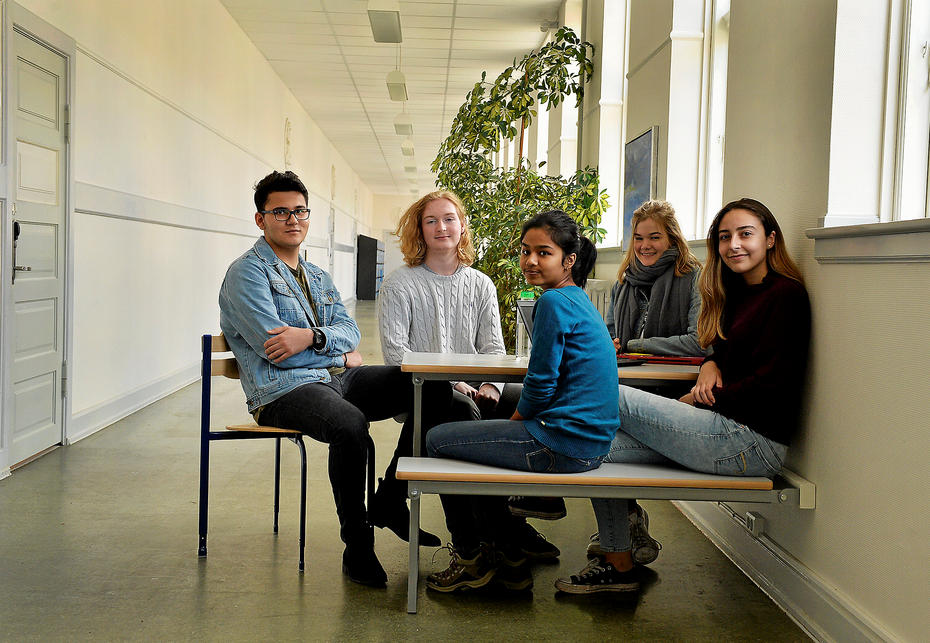


Year 10 and Year 11 (14-16 years old)
At the end of Year 9, students will move into the IGCSE program where they will spend two years working towards taking their final IGCSE (International General Certificate of Secondary Education) exams at the end of Year 11. The only exception is English Literature, which is currently taken at the end of Y10. We also offer the opportunity of sitting an Additional Mathematics exam at the end of Year 11, for those students who are confident and competent in the subject.
IGCSE - subjects and trips
IGCSE subjects:
English Literature, English First Langauage, Mathematics, Combined Science, History, Global Perspectives, and Spanish.
There is a chance to sit IGCSE Physical Education as an elective.
Non-IGCSE subjects:
Physical Education, Elective (Extra Mathematics, Digital Design), Religion
Trips abroad:
Year 10 Students will take part in a student exchange trip with a school to Spain or France.
Year 11 Students will travel to Rome.
All trips are included in school fees
IGCSE subjects
The Cambridge IGCSE encourages learner-centred and enquiry-based approaches to learning. It develops learners’ skills in creative thinking, enquiry and problem solving, giving learners’ excellent preparation for the next stage in their education. IGCSE qualifications are globally recognised by employers and educational institutions, and are commonly used as a stepping-stone for students to later enrol in local upper secondary schools in almost every country in the world. The programme is suitable for students with English as either a first or second language, as the examinations process recognises and makes allowances for the linguistic diversity of individual students.
NON-IGCSE SUBJECTS
-------------------------- Students attending our Danish Level 4 class in Year 10/11 will receive four Danish lessons per week and can choose to take the Danish language part of the FSA exam, if the teacher together with the parents deem this the right choice. This is optional and is not a requirement by the Danish government to be able to continue into a Danish gymnasium, it is merely an additional certificate.Additional subjects like PSHE and Religion are not offered at IGCSE level, and the students will therefore not be taking end of year exams in these subjects, however, these subjects still form part of the school’s curriculum.
Do you have a question? You can find the answer here.
Our Cambridge Upper Secondary (IGCSE) program at
Skt. Josef’s
Our tailored Skt, Josef’s Upper Secondary/IGCSE (International General Certificate of Secondary Education) program caters for students in Years 10 and 11. The Cambridge IGCSE is the world’s most popular international qualification for 14 to 16 year-old students. It is the ideal preparation for further study, equipping students with the knowledge and skills for their A-levels or the International Baccalaureate (IB) Diploma.
Our Cambridge Upper Secondary/IGCSE programme covers the following Cambridge International Curriculum subjects at each Year level:
In addition, our Skt. Josef’s upper secondary/IGCSE students study the following locally designed subjects:
Electives (Digital Design, New Maths)
Physical Education (possibility to sit as an IGCSE)
Religion
PSHE (Personal, Social, Health and Economics)
Selected students may study and take the Danish Ministry of Education’s Advanced Danish subject and FP10 exam in Year 11.
Reporting
Students will be assessed continually on a formative basis through the day-to-day teaching and learning process. Formal assessment can take place in the form of progression tests and checkpoint tests.
School reports are written for all core subjects. A progress report is written twice a year together with an End of Year report. They are used as a basis for pupil/teacher conferences where class teacher and subject teachers talk with pupils on a one-to-one basis about their performance throughout the year and decide on the path forward. A copy of this report is sent home to parents.
At the completion of the course, students will receive exam results and certificates from Cambridge.
Parent information
Parents’ meetings are held at the beginning of the new school year. Parents, without their children, are invited to come along to information meetings. The topics cover everything from social to practical aspects of school life such as the school year, the curriculum and important dates. This is an opportunity to ask any questions you might have.





